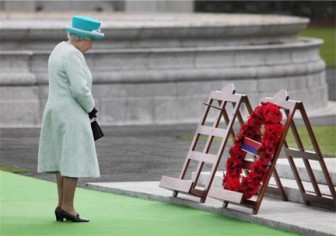DUBLIN, (Reuters) – Queen Elizabeth offered her sympathy and regret yesterday to all those who had suffered from centuries of conflict between Britain and Ireland in a powerful and personal address to the Irish nation.
“To all those who have suffered as a consequence of our troubled past I extend my sincere thoughts and deep sympathy,” the queen said in a televised speech at a banquet in Dublin Castle, once the nerve centre of British rule in Ireland.
Dressed in a floor-length white gown with a diamond harp brooch glittering on her shoulder, the queen floored the assembled dignitaries when she began by addressing Ireland’s President Mary McAleese and the audience in the Irish language.

“Wow,” McAleese exclaimed, and the room burst into a spontaneous round of applause.
In her four-day state visit, the first by a British monarch since Ireland won its independence from London in 1921, the queen has shown a determination to address the bloody past and offer powerful gestures of reconciliation.
Her speech stopped short of an apology for British brutality but its reference to: “being able to bow to the past, but not be bound by it” struck the right note with Irish people, many of whom believe the country needs to leave its troubled relationship with Britain in the past.
The queen, whose cousin was killed by militant Irish nationalists in 1979, also alluded to her own loss in an address which was watched in living rooms across the island.
“These events have touched us all, many of us personally, and are a painful legacy.”
Historic stadium visit
Just hours earlier, the queen undertook one of the most daring diplomatic engagements of her 59-year reign when she stepped out into Ireland’s Croke Park stadium, scene of a massacre by British troops.
In a gesture that summed up how far relations between Ireland and its former colonial master have come, the queen was brought into Croke Park through the Hogan Stand, named after a player killed on “Bloody Sunday” nearly a century ago.
She met players, chatted about Irish sport and was entertained by a marching band and traditional dancing, although the seats around the vast stadium were empty — a reflection of the tight security around the trip.




